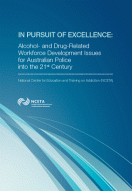Police
The role of police is central to Australia's AOD-related efforts and activities. In many cases, police are the first of the frontline workers required to respond to AOD-related issues. This may involve dealing with AOD-affected individuals and consequent or associated criminal behaviour. It also includes the policing of licensed premises, illicit drug law enforcement, preventing/responding to drug-related acquisitive crime and preventing/responding to drink and drug-related driving. Accordingly, operational police may end up spending as much, if not more, of their time in dealing with AOD-related issues as workers who are actually employed in the AOD field.
Liquor Licensing Legislation In Australia
There is growing interest and concern in relation to the harms stemming from alcohol and the potential role played by liquor licensing legislation to contain or minimise such harms. In light of this, researchers at the National Centre for Education and Training on Addiction (NCETA), at Flinders University undertook a national review liquor of licensing legislation. This project was undertaken to examine the legislation in detail and to identify its strengths and weaknesses, especially from a law enforcement perspective.
The review involved a detailed examination of legislation from each of Australia’s states and territories as at 30 December 2010. The project also involved interviewing police from around Australia to gain their perspectives on the effectiveness of the legislation. This is the first time that such an examination has been undertaken.
The project was initiated by Australia’s Intergovernmental Committee on Drugs and funded through the National Drug Strategy Cost Shared Funding Model. The project was overseen by, and undertaken in partnership with, South Australia Police.
The reports from this project:
- identify the key features of liquor licensing legislation in each state and territory and provide examples of effective legislative tools
- highlight the perspectives of law enforcement personnel concerning their roles in preventing and reducing alcohol-related crime and associated harms, and
- recommend improvements to liquor licensing legislation.
The reports from the study also identify areas in which legislation and administrative arrangements could be strengthened to better enable police to reduce alcohol-related problems. The reports may be downloaded by clicking on the links below.
NCETA Resources
|
Alcohol and licensed premises: Best practice in policing, a monograph for police and policy makers [pdf, 1575 KB] |
|||
| Alcohol & other drugs, mental health & comorbidity: A training review [pdf, 3754KB]
|
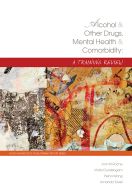 |
||
| Alcohol & other drugs workforce development issues and imperatives: Setting the scene [pdf, 4864 KB]
|
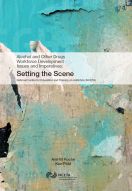 |
||
| A compendium of alcohol and other drug-related resources for law enforcement in Australia [pdf, 1122 KB] | |||
|
In pursuit of excellence: Alcohol and drug related workforce development issues for Australian police into the 21st century [pdf, 1321 KB] |
|
||
Liquor Licensing Reports |
|||
| Trifonoff, A., Andrew, R., Steenson, T., Nicholas, R., & Roche, A.M. (2011). Liquor Licensing in Australia: An Overview. Adelaide, SA: National Centre for Education and Training on Addiction (NCETA), Flinders University. | 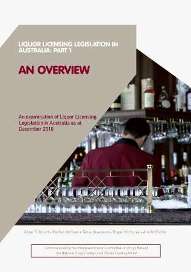 |
||
|
Trifonoff, A., Andrew, R., Steenson, T., Nicholas, R., & Roche, A.M. (2011). Liquor Licensing in Australia: A Jurisdictional Breakdown. Adelaide, SA: National Centre for Education and Training on Addiction (NCETA), Flinders University. |
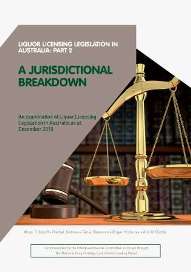 |
||
|
Trifonoff, A., Andrew, R., Steenson, T., Nicholas, R., & Roche, A.M. (2011). Liquor Licensing in Australia: Police Expectations and Experiences. Adelaide, SA: National Centre for Education and Training on Addiction (NCETA), Flinders University. |
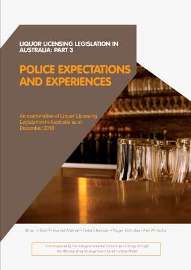 |
||
|
Trifonoff, A., Andrew, R., Steenson, T., Nicholas, R., & Roche, A.M. (2011). Liquor Licensing Legislation in Australia: Executive Summary. Adelaide, SA: National Centre for Education and Training on Addiction (NCETA), Flinders University. |
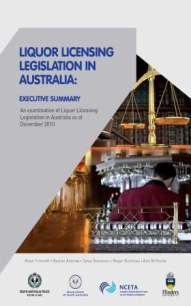 |
||
Order the Reports
Please contact us to order reports in hard copy or electronic copies on DVD.
Other Resources
- Fleming, J. (2008). Rules of engagement: Policing anti-social behaviour and alcohol-related violence in and around licensed premises. NSW Bureau of Crime Statistics and Research [pdf].
- Donnelly, N., Scott, L., Poynton, S., Weatherburn, D., Shanahan, M., & Hansen, F. (2007). Estimating the short-term cost of police time spent on alcohol-related crime in NSW. Hobart: National Drug Law Enforcement Research Fund [website].
- Homel, P., & Willis, K. (2007). A framework for measuring the performance of drug law enforcement. Trends and issues in criminal justice no. 332. Canberra: Australian Institute of Criminology [website].
- Delahunty, B., & Putt, J. (2006a). Good practice framework: policing illicit drugs in rural and remote Aboriginal and Torres Strait communities. Payneham, SA: National Drug Law Enforcement Research Fund [website].
- Spooner, C., McPherson, M., & Hall, W. (2004). The role of police in preventing and minimising illicit drug use and its harms. Canberra: Australian Government Department of Health and Ageing [website].
- Jenner, L., Baker, A., White, I., & Carr, V. (2004). Psychostimulants - Management of acute behaviour disturbances: Guidelines for police services. Canberra: Australian Government Department of Health and Ageing [website].
- Nicholas, R. (2000). Education and training for police on the broad range of drug issues. Discussion paper for the Commissioners' Drug Committee of the Conference of Police Commissioners of Australasia and the South West Pacific Region. South Australia: Australasian Centre for Policing Research.
